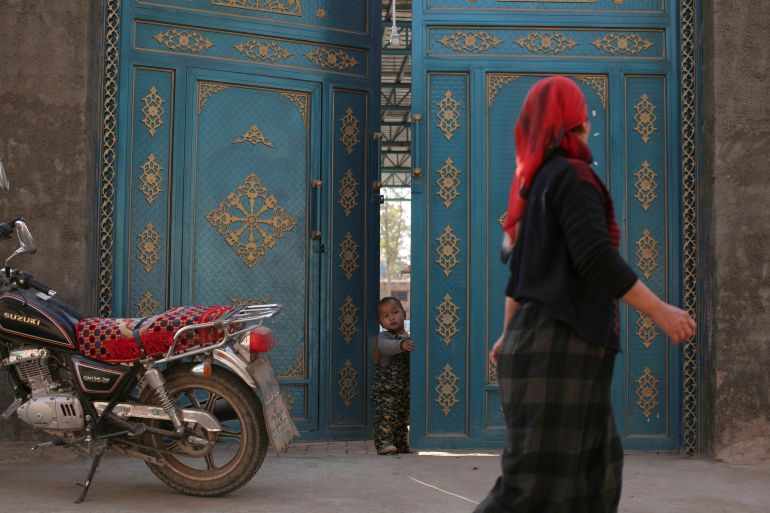UK government urged to hold China ‘to account’ over Uighurs
British lawmakers from across the political spectrum call on PM for a partial Winter Olympics boycott and cotton trade ban.

A group of influential British lawmakers have urged the government to take tougher action against China over its treatment of minority groups, including a partial Winter Olympics boycott and cotton trade ban.
In a report following a months-long inquiry, Parliament’s Foreign Affairs Committee on Wednesday recommended exploring the feasibility of an International Criminal Court probe into the alleged crimes against Uighur Muslims and others in the northwestern Chinese region of Xinjiang.
Keep reading
list of 4 itemsPakistan’s Khan backs China on Uighurs, praises one-party system
Bachelet seeks Xinjiang trip amid reports of Uighur persecution
China policies ‘could cut millions of Uighur births in Xinjiang’
The cross-party committee, led by Conservative politician Tom Tugendhat, said in a report that the “atrocities” being committed in Xinjiang “represent an international crisis of profound urgency, making it unconscionable for any civilised government to look the other way”.
It called on the government to accept MPs’ view – expressed in a symbolic April vote – that minority groups there are suffering genocide and crimes against humanity, and take stronger action “to bring these crimes to an end”.
The cross-party group wants Britain to use every diplomatic lever to pressure Beijing to allow international observers – in particular the United Nations High Commissioner for Human Rights – access to Xinjiang.
It also backs a fast-track asylum process for those fleeing persecution in the region, forming a coalition of “sanctuary states” with Western allies.
“It’s time for big boy politics,” said committee member Alicia Kearns, also a Conservative. “We are the mother of all parliaments. If we are not willing to speak up for those who others seek to silence, then what parliament’s going to do it?”
Rights groups believe at least one million Uighurs and other mostly Muslim minorities have been detained in camps in Xinjiang, where China is also accused of forcibly sterilising women and imposing forced labour.
Beijing has denied all allegations of abuses and has insisted its policies in Xinjiang are necessary to counter violent “extremism”.
‘Nesting the dragon’
In their 37-page report – Never Again: The UK’s Responsibility to Act on Atrocities in Xinjiang and Beyond – the British MPs argued the “truly horrifying” crimes taking place are “an international call to action”.
Among the recommended responses, it urges Prime Minister Boris Johnson’s government to ensure that Beijing “faces consequences” when it hosts the 2022 Winter Olympics.
The committee wants ministers and dignitaries to skip the opening and closing ceremonies, discourage British businesses from sponsoring or advertising at the event, and encourage fans and tourists to stay away.
On Wednesday, Johnson indicated that he was not minded to boycott the Games, telling lawmakers that he is “instinctively” against sporting boycotts.
“This country has led the world in condemning human rights abuses in Xinjiang and in putting sanctions on those responsible, in holding companies to account that import goods made with forced labour in Xinjiang,” Johnson said.
Meanwhile, the report urges the government to explore a ban on the import of all cotton products linked to Xinjiang, which supplies the vast majority of China’s cotton.
More than 570,000 people are estimated to have been obliged to pick cotton in the Xinjiang region.
It also wants surveillance companies such as Hikvision – which provide surveillance equipment to the detention camps there – to be forbidden from operating in Britain.
The United States, which has accused Beijing of genocide in Xinjiang, has already imposed various trade sanctions targeting producers and users of cotton as well as tomato products and hair products such as weaves originating from the region.
Last month it also banned imports of solar panel materials from a Chinese company and placing restrictions on four others for alleged use of forced labour in Xinjiang.
“We still have time to make these choices, and if we choose not to, what we’re doing is nesting the dragon deeper and deeper into our national life,” committee chair Tugendhat said.